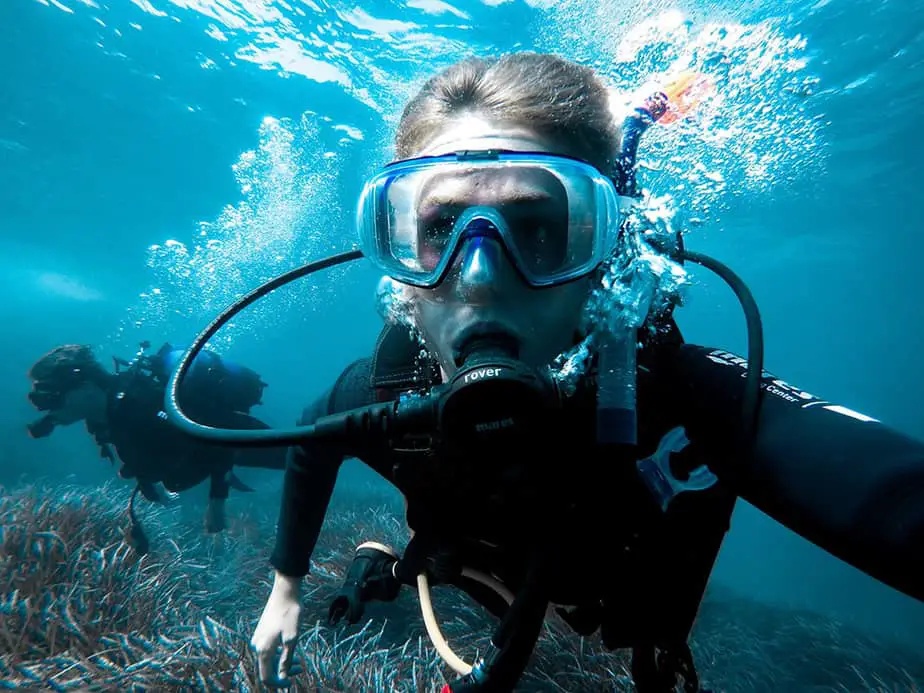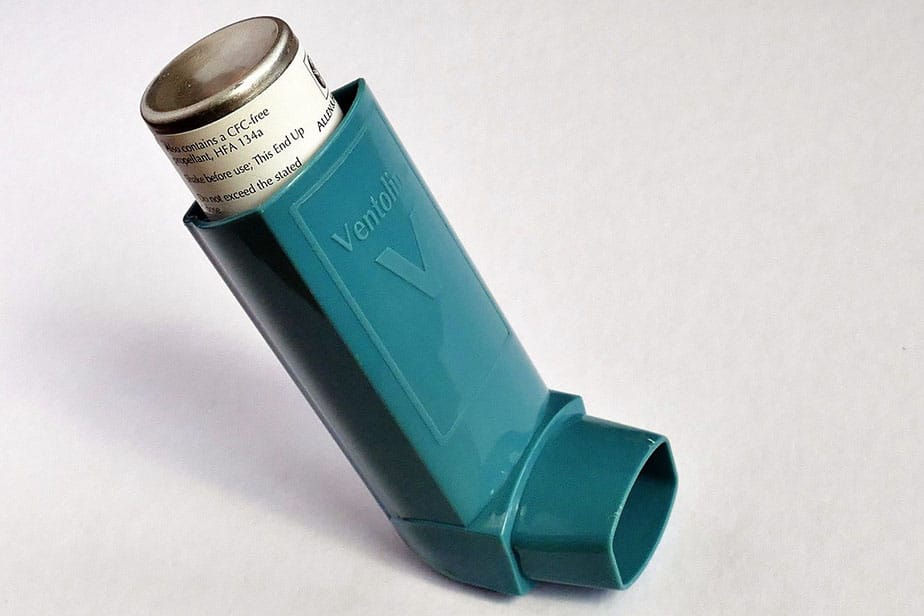Is it possible to dive with asthma? Should you? The answer to the first question is yes, and the answer to the second is that there is no consensus. In the past, the answer would have been a resounding NO! No doctor in their right mind would have cleared their patients for diving if they have a history of asthma. Nowadays, the accepted opinion is beginning to change and having asthma is no longer an absolute contraindication as it once was.
In order to get the doctor’s approval to dive with asthma, potential divers must be evaluated to determine the severity of their asthma, their fitness to dive, and what kind of medication, if any, is required. The doctor will consider the history of the attacks, the type of asthma it is, how easy it is to trigger an attack, and its severity. If you have asthma and want to scuba dive, you must first consult your doctor and undergo an evaluation before heading out into the water.
What is asthma?
Asthma is a chronic condition that affects 12.8% of the American population, and can occur during childhood or very rarely in adulthood. If a child has asthma, most of the symptoms will naturally disappear as they grow older but not always.
Asthma causes one’s airways to contract if exposed to certain triggers. People with asthma (asthmatics) can suffer an attack when exposed to their specific trigger, which may vary from person to person.
Common triggers for asthmatics are allergens, the cold, exercise, or stress. Notice how scuba diving has three out of the four triggers? During an attack, asthmatics will find it difficult to breathe as their airways contract, and insufficient air is reaching their lungs.
Why is asthma so dangerous for scuba diving?
There are few restrictions on who can scuba dive, to the point that almost anyone can scuba dive if they put in enough effort. Yet if you have asthma, you may not be allowed to dive. How come?
Physical exertion, stress, anxiety, and the cold are major causes of asthma attacks. Should an attack occur, the asthmatic’s airways may contract so much that breathing becomes nearly impossible.
The diver may also panic and try to ascend too quickly, putting them at risk of decompression sickness and, more immediately, lung over-expansion. As you can imagine, if that were to occur underwater, it could lead to a deadly result. Scuba diving is generally high risk for an asthmatic.
To counteract this, the diver with asthma needs to take their medicine which comes in the form of an aerosol inhaler. Unfortunately, it is not possible to take it underwater, so the diver must somehow endure long enough to safely ascend and reach the surface before taking the medicine. It will be difficult to stay calm enough to do this, and the diver may lose consciousness, which only adds to the problem.
On top of that, asthma attacks are often worsened by inhaling cold, compressed, dry air. We have no choice but to breathe compressed air underwater because the pressure of the surrounding water cannot be avoided. This pressure also makes it hard for us to inhale and exhale because our lungs are also affected by it. Thus, the deeper the dive, the more difficult it becomes to breathe.
When an asthmatic suffers an attack at deep depths, their already contracted lungs contract even further, making it nearly impossible to breathe. When a diver ascends, the surrounding pressure decreases and their lungs will start to expand to its normal size. The air inside will also expand, which is normally not an issue for non-asthmatic divers but can be deadly for asthmatics.
Lung overexpansion, a life-threatening injury that can occur when the air in the lungs expands beyond the lungs’ capacity to hold it in, is a problem that can occur to divers who hold their breath while ascending. When an asthmatic is suffering from an attack, their contracted airways prevent air from getting in or out, which is essentially the same as holding their breath.
The expanding air will find another way out, if not from the airways, then by rupturing the lungs and escaping into the bloodstream, leading to more severe, possibly fatal outcomes.
Severity of asthma
Not every asthmatic has the same type or severity of asthma. As we mentioned, asthma can be triggered by allergens, and this may not be as big of an issue while scuba diving. The problem arises when the asthma is caused by exercise, which you will be doing a whole lot of while diving. A diving doctor will test the severity of your asthma to see if you can still be approved for diving. The severity can be categorized into four levels:
Intermittent: Characterized by a 20% decrease in air flow through the airways. Shortness of breath, coughing and wheezing may occur but not enough to interfere with normal activities. Patients may need to use a bronchodilator to reduce the symptoms.
Mild persistent: Characterized by a 20% decrease in airflow with a 20-30% variance. Symptoms like shortness of breath may occur a few times a week, particularly at night. The severity of the symptoms have increased to the point that it is interfering with daily activities.
Moderate persistent: Characterized by a 20-40% decrease in airflow. Symptoms occur daily, and medication needs to be taken everyday to keep them in check. The symptoms are so severe they can interfere with daily activities, and lung function is considered abnormal.
Severe persistent: Characterized by a 40% or greater decrease in airflow. Symptoms appear everyday and last throughout the day, occurring even at night. The symptoms are so severe it becomes difficult to perform any daily activities. Lung function is considered abnormal.
Patients that fall into the first two categories may still be able to scuba dive provided they follow their doctor’s instructions fully. The next section deals with what you might have to go through to get approved to dive with asthma.
Getting cleared to dive with asthma

If you have asthma or have had it in the past, even if it was when you were a child, you should get a check up done preferably by a diving doctor. A diving physician will consider various factors when determining if you are fit to dive.
For example, if your asthma is triggered by an allergen, such as dust or pollen, then chances are good that you will be cleared to dive. Depending on the allergen (e.g. pollen or fur), it may not contradict diving since it is unlikely you’ll encounter it underwater, however you still need a doctor to evaluate and clear you before you head out for a dive.
On the other hand, if your asthma is triggered by exercise, stress, or the cold, then you will need to pass some tests, such as a Peak Flow Test, to prove you can perform adequately underwater.
It is possible that the asthma medication you take can keep your asthma under control enough that the doctor clears you for diving. Some medications are approved for use while diving, and the doctor will recommend when you should take it and how much before diving to prevent an attack while you’re underwater.
Asthma is not normally a life-threatening condition, however if you decide to go scuba diving, it can lead to some deadly scenarios. If there is just one thing you take from this article, it’s that you should follow your doctor’s advice if you want to scuba with asthma. If your doctor says no, then too bad. Various medicine authorities recommend you follow this checklist:
- Divers with a history of asthma must first see a diving physician who specializes in hyperbaric treatments and complete a physical exam.
- The diver must successfully pass the tests conducted by the doctor.
- Prior to diving, asthma medication must be taken to keep it in check.
- A few days prior to the planned dives, if the asthmatic diver feels their condition is worsening or they need to use a rescue inhaler, cancel the dives.
- Use a rescue inhaler 30 minutes before diving as a preventative measure against asthma symptoms, or as directed by a doctor.
Even after you have been given the all-clear by a diving physician, you are not cleared for life unfortunately. The human body is constantly changing and if it has been some time since your last evaluation, then you should schedule an appointment for a new one.
Conversely, just because you failed the evaluation before does not mean you will keep failing forever. Try again in the future and you may pass it.
Why are physical tests needed?
The doctor cannot determine whether you are fit to dive until they have given you a physical test. Here, the physician will see how well your lungs can handle exertion and how much your airways are constricted during an attack. Divers who haven’t had an attack in a long time may still be unfit for diving if their lung condition is poor. Doctors who have not conducted a physical evaluation before giving you a response have no idea whether you’re actually fit enough or not.
Tests to evaluate fitness to dive
The evaluation tests the doctor may put you through are non-invasive and straightforward.
Spirometry: A spirometry test requires the patient to inhale and exhale into a machine that takes the information and evaluates their lung function. For instance, the patient may be asked to inhale and exhale into the machine for as long as they can.
Peak Flow Test: This test uses either a simple peak flow meter or a sophisticated spirometer. The meter estimates your Peak Expiratory Flow Rate (PEF), which is how fast you can exhale the air in your lungs after fully inhaling. The information gleaned from a simple peak flow meter may not be as reliable compared to a spirometer.
Bronchial Agitation Test: Saline water is aspirated into the patient’s lungs and data is collected based on how the lungs react. Some doctors are against this test because they claim it can lead to false positives.
Exercise Tests: The doctor may perform a spirometry or peak flow test before and after exercise to measure the difference in lung performance at rest and under an asthma attack, if one is even triggered by exercise.
Post Bronchodilator Test: Like the exercise test, a patient’s lungs may be examined before and after the use of an asthma-controlling medication to determine how effective the medication was. If the doctor is happy with the results, they may approve the patient for diving as long as they take their medication before diving.
Should you dive with asthma?
This is not a decision to be made lightly. You will first need to check with your doctor. After careful testing and deliberation, even if you are cleared to dive, you are still taking a big risk by diving with a medical condition.
While it is not ideal for someone with asthma to scuba dive, with the advancement of medicine and the buddy system, it is possible to safely dive with asthma. You should let the divemaster and your dive buddy know about your medical condition so that they can keep an eye out for you.
Furthermore, it’s best to avoid deep diving since this not only increases the risk of decompression sickness, but if you suffer an asthma attack, you may literally be incapable of breathing. If you are comfortable with the risk and you are following your doctor’s directions perfectly, at the end of the day it’s your decision, but we hope you priortize your safety.


